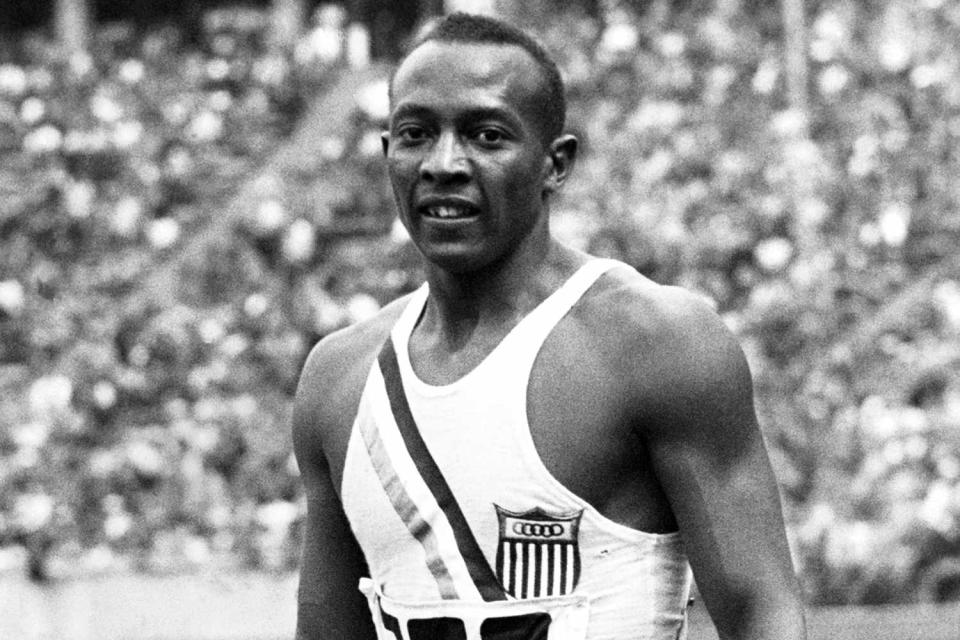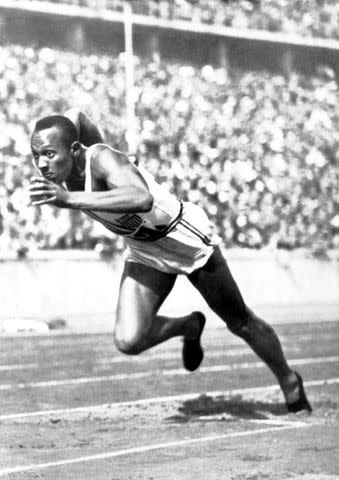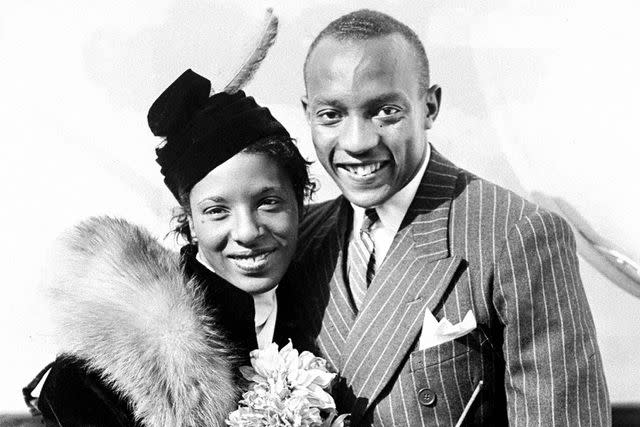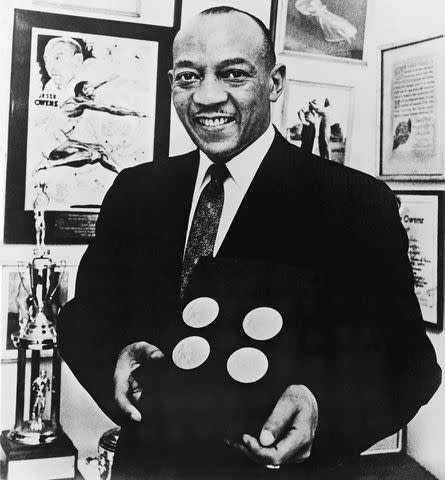Jesse Owens’ Daughters on Who Their Dad Was Off the Track: 'Daddy Was Just a Loving Person' (Exclusive)
Beverly Owens Prather and Marlene Owens Rankin admired their father’s values in sports and beyond

Hulton-Deutsch Collection/Corbis/Getty
Jesse Owens at the 1936 Olympics in Berlin.Jesse Owens’ daughters didn't know he was famous.
The world record-breaking track athlete, who famously went up against Hitler’s ideologies and the dictator himself at the 1936 Berlin Olympics, kept his family life separate from his sports career.
"What Daddy did was admired, but was not a conversation that was had at home,” his daughter Beverly Owens Prather tells PEOPLE. “Mother would tell us certain things, but we only knew so much because I guess she didn't wanna stress us out and worry us to death.”
Owens’ daughter Marlene Owens Rankin echoed her sister, saying, "I always felt safe with him. Present or not present, he was always present. Whether he was physically there or not, our mother would see that he was there in spirit.”
The gold medal winner married Minnie Ruth Soloman in 1935 and the couple shared three daughters: Gloria Owens Hemphill, Prather and Rankin. The family was tight–knit even with Owens’ frequent travel — Prather and Rankin note that they speak for all three of the sisters even though Gloria couldn’t be present to share her thoughts about their father.

Photo12/UIG/Getty
Jesse Owens during the Berlin Olympic Games in 1936.The sisters, along with historians and fellow athletes, are telling Owens’ story anew in a documentary from the History Channel and LeBron James’ production company UNINTERRUPTED called Triumph: Jesse Owens and the Berlin Olympics. The two-hour special, which aired on Juneteenth, tells Owens’ story via the lens of that fateful Olympic games, which the athlete attended after he was emboldened by his father to go despite calls for boycotts on the basis of Hitler’s increasing fascist and anti-semitic policies.
The sprinter figured winning was a bigger act of protest, especially because plenty of hypocritical discrimination was happening on his home turf, too. And win he did. Owens took home four gold medals from the Berlin Olympics in the 100-meter dash, the long jump, the 200-meter sprint and the 100-meter relay.
Eventually, Rankin and Prather learned of their father’s early legacy when kids at school began telling them things Owens had accomplished. The preconceived notions that came with their father's legacy could sometimes be stifling, but in those moments, the sisters remembered who they knew their father to be.
“He was a devoted family man. He was a friend, a true friend, and had a tremendous sense of fair play,” Rankin says. “Daddy was just a loving person,” Prather adds.

Joseph Costa/NY Daily News Archive/Getty
Jesse Owens and his wife, Minnie Ruth Solomon Owens, on his return from the Olympics in Berlin.Years later, in 1950, the whole family attended a testimonial dinner in Owens’ honor, marking Rankin and Prather's first time getting a real look into the feats of their father.
“We got very dressed up and went to a very fancy hotel and had a fancy dinner which we had not done before. So this was all new to us. And so it was driving home to us who he was to other people,” Rankin says. “He was just daddy to us.”
Despite Rankin and Prather's initial innocence of their father’s fame, he gained admirers around the world. One such fan was fellow Alabama-born track athlete Carl Lewis who met Owens at one of his races. The budding sprinter might have been smaller than his competitors, but he won, grabbing the attention of Owens.
“He made a comment about my size because I actually won that day. He was talking about hard work and saying look at the little kid, like that little kid, he won,” Lewis tells PEOPLE of his first time meeting Owens.
Years later, Lewis matched Owens’ 1936 feat at the 1984 Los Angeles Olympics, winning four gold medals in the same four events. He says he never would have thought to dream of this accomplishment without Owens’ influence.
“You started off as a kid at Alabama, which I did as well,” Lewis says, addressing what he would tell Owens if he were alive today. “You achieved your fame but you were in a lot of cases laughed at, ostracized, criticized, knocked down, but you never lost your humanity.”

Hulton Archive/Getty
Jesse Owens poses with the four gold medals he won at the 1936 Berlin Olympics in 1955.Owens might have been up against an immense amount of pressure to prove Hitler wrong, win all of his races and support his growing family in a racist nation, but Lewis, Rankin and Prather just remember a calm, loving man who “wanted you to be the best that you could be.”
"Because he didn't lose humanity, he inspired me 50 years later,” Lewis says. “He was able to rise above the bulls---- and then at the end inspire hundreds of thousands of kids through his programs, whereas all those people that went against him are forgotten in history.”
At the end of the day, Owens had his daughters and Ruth, whom Rankin and Prather say was the “backbone” of their family. "He called every night, every night. They talked every single day, even when he was away,” Rankin says.
Triumph: Jesse Owens and the Berlin Olympics is streaming now on The HISTORY Channel app and history.com, and available to purchase on Prime Video.
For more People news, make sure to sign up for our newsletter!
Read the original article on People.


